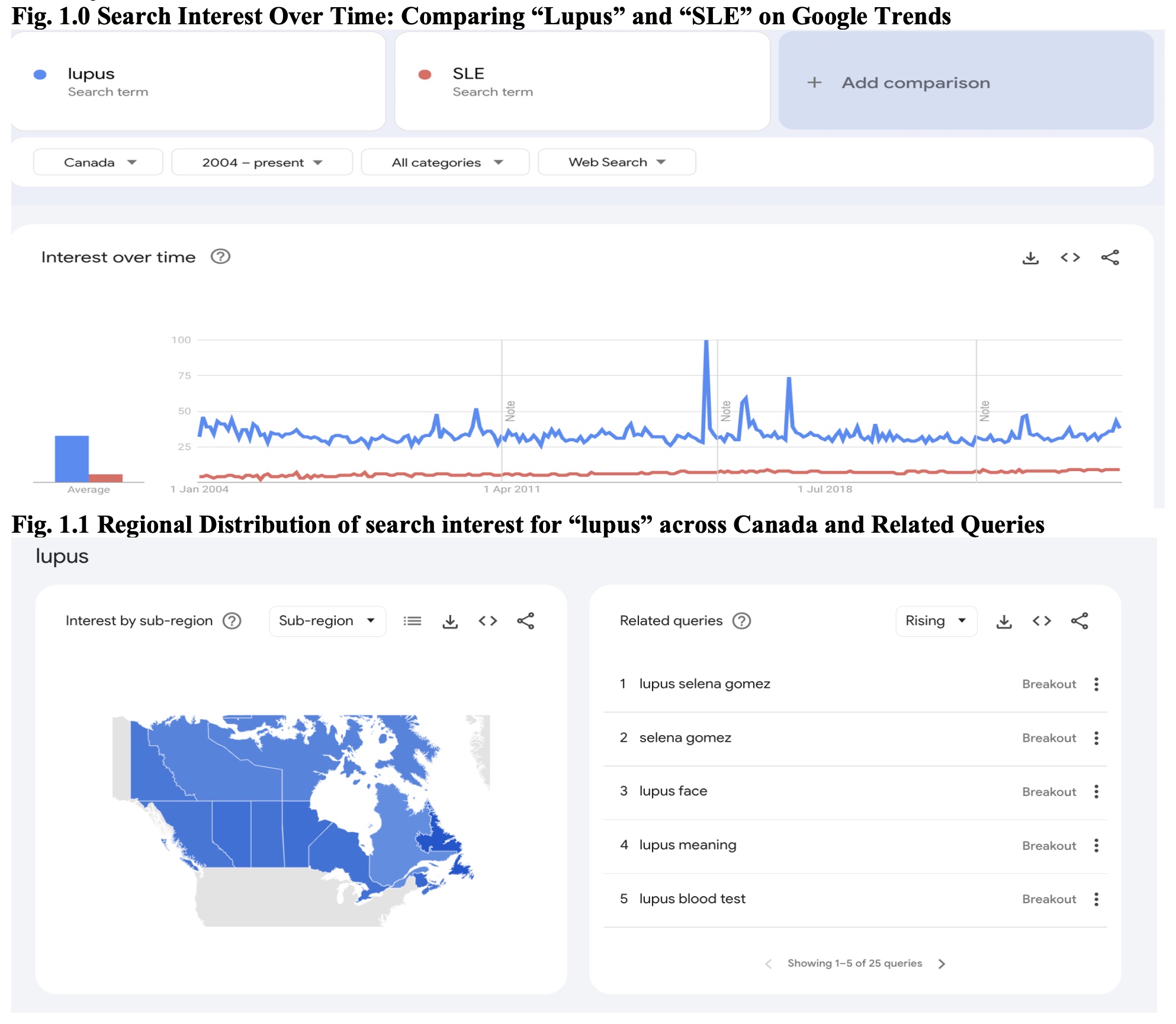Session Information
Session Type: Poster Session A
Session Time: 10:30AM-12:30PM
Background/Purpose: A lack of knowledge surrounding SLE has been identified as a main challenge for patients, particularly those seeking a diagnosis or recently diagnosed. Subsequently, many turn to online sources for information, where they risk encountering misleading or even endangering mis- or disinformation. Hence, we investigated the public awareness of SLE and how this varies spatially across Canada using health geographical approaches to examine Google Trends (GT) data, a tool for assessing public knowledge and information.
Methods: This research employs a health geographical approach to exploring spatial and temporal trends in information-seeking behaviours and associated knowledge gaps related to SLE in Canada. Using GT, relative search volumes (RV), associated topics and queries were collected from 2004-2024, using keywords for “lupus” (Fig1). The top 25 search terms were collected from each province and territory, and these search terms were analyzed thematically. The research process leveraged an integrated knowledge translation approach, in which a patient partner living with SLE was a key part of the research team.
Results: Search volumes for the search term “lupus” in Canada hit an all-time peak in October 2015 (RV=1.0) (Fig2,Table). This peak occurred in all provinces simultaneously, correlating with celebrity Selena Gomez’s SLE diagnosis. Additional peaks were observed across Canada in July 2009 (RV=0.58), September 2016 (RV=0.69), and September 2017 (RV=0.78), all of which were correlated with milestones in the development and eventual approval of belimumab for SLE. Similarly, a peak in August 2016 (RV=0.66) was associated with positive Phase II trials for voclosporin. A national peak in June 2010 (RV=0.60) was associated with the 9th International Congress on SLE held in Vancouver, Canada. There was a marked trough across all Canadian provinces in November and December 2020 (RV=0.28), perhaps reflecting that SLE-related concerns were overshadowed by the ongoing COVID-19 pandemic. Overall, interest was highest in Newfoundland (RV=1.0), New Brunswick (RV=0.83), and Manitoba (RV=0.80), though the top related topics and queries varied spatially among provinces. The most frequently searched terms typically fell within the following themes: causes of lupus, diagnosis, symptoms, medication, and treatment. Some search terms were spatially unique, only appearing in one province, including search terms in French (“lupus maladie”, Quebec), and Indonesian (“penyakit lupus”, Newfoundland) languages.
Conclusion: An understanding of the information needs of the general public related to SLE, and how they vary spatially, is critical for designing and implementing targeted and effective patient education interventions. To this end, these research results will be shared and triangulated with the knowledge needs of advocacy organizations and the realities of lived SLE experience, through a deliberative dialogue with key stakeholders from across Canada. This research and deliberative dialogue will set a foundation for the design and implementation of relevant interventions to effectively reduce SLE-related health disparities and improve SLE-related quality of life nationwide.
 Figure 1. Google Trends dashboard displaying 1.0) search interest over time and 1.1) regional distribution across Canada
Figure 1. Google Trends dashboard displaying 1.0) search interest over time and 1.1) regional distribution across Canada
.jpg) Figure 2. Relative Volume (RV) for the search term “lupus” across Canada (2004-2024)
Figure 2. Relative Volume (RV) for the search term “lupus” across Canada (2004-2024)
.jpg) Table. Timeline, Key Events & Major Peaks, Search for “Lupus” (Canada 2004–2024)
Table. Timeline, Key Events & Major Peaks, Search for “Lupus” (Canada 2004–2024)
To cite this abstract in AMA style:
Williamson T, Shantz E, Elliott S, Sperling C, Costenbader K, Choi M. Investigating Canadians’ information needs related to lupus: A Google Trends analysis of online search query data [abstract]. Arthritis Rheumatol. 2025; 77 (suppl 9). https://acrabstracts.org/abstract/investigating-canadians-information-needs-related-to-lupus-a-google-trends-analysis-of-online-search-query-data/. Accessed .« Back to ACR Convergence 2025
ACR Meeting Abstracts - https://acrabstracts.org/abstract/investigating-canadians-information-needs-related-to-lupus-a-google-trends-analysis-of-online-search-query-data/
